WOHESC
WOHESC Blog
A Look Back at WOHESC 2019

 At the end of February, over 600 passionate individuals came together in Seattle for WOHESC to learn, connect and strategize for the future of climate justice in higher education. This year's event was an immense success thanks to our attendees, speakers, sponsors, and partners who helped us build the conference. We spent two and half days learning, growing and connecting around issues of equity, sustainability, and development within higher education.
At the end of February, over 600 passionate individuals came together in Seattle for WOHESC to learn, connect and strategize for the future of climate justice in higher education. This year's event was an immense success thanks to our attendees, speakers, sponsors, and partners who helped us build the conference. We spent two and half days learning, growing and connecting around issues of equity, sustainability, and development within higher education.
This year's WOHESC theme focused on aligning equity and diversity efforts within sustainability initiatives and emphasized making inclusion central to our work. Social sustainability is just as important as environmental sustainability; conversations took a deep dive into how these two paramount issues converge. This important theme was woven throughout our program in both keynote and plenary discussions as well as breakout sessions. The Equity and Diversity track was standing room only on our first day so we moved these sessions onto the main stage on day two! These sessions allowed attendees to examine systemic change and generate dialogue to guide action within their own schools and communities. It was truly inspiring to see such enthusiasm for meaningful progress by so many motivated individuals.
The University of Washington was established in 1861 and they have worked hard to build sustainable solutions into their current and future planning. This beautiful campus offered attendees the chance to view sustainable practices in action through tours of cutting edge facilities, case studies presented during sessions, a balance-focused yoga class and a focus on a recognition of place at our Opening Night Reception at the Intellectual House, a multi-service learning and gathering space for American Indian and Alaska Native students, faculty and staff, and others from various cultures and communities to come together in a welcoming environment to share knowledge.
Our 2019 conference program was dedicated to creating space for innovative solutions within higher education inclusive of partners from surrounding communities and industries. Each session was focused on driving action and delivering next steps for our attendees through new ideas, inspiration, and solutions as they go back to their respective schools and organizations.
We recognize that sustainability, like education, must acknowledge each diverse aspect of the established system while working towards change and innovation. We were delighted to see our attendees come together during each program segment to collaborate and discuss how to build change into their organizations as students, educators, and staff members.
We kicked off day one with an Opening Keynote from the Dean of the College of the Environment at the University of Washington Lisa Graumlich. Her inspiring words set the tone for the rest of the conference, and you can hear her speech at WOHESC here on the UW Sustainability In Our Nature podcast.
Thank you to all of our attendees and collaborators for sharing your enthusiasm on social media, and a special thank you to the University of Washington for your amazing photos! You can view a recap of attendee social media feedback for #WOHESC here.
The second day of WOHESC began with an Opening Keynote from Laura Clise, Founder and CEO of Intentionalist. Her focus on the importance of 'spending like it matters' took attendees outside of the academic realm and challenged us to use our consumer spending power to match our value systems in the choices that we make each day. Our day two Plenary offered us an incredible opportunity to hear from participants in the revolutionary climate action lawsuit currently being brought against our federal government by 21 young plaintiffs. This case has been in the news recently, including a feature on television show 60 Minutes. We were happy to have this one of a kind group with us to share how they are making a difference through action!
Check out our amazing resident artist Justin Masi - graphic facilitator, who through his drawings showcased our next steps, action items and lessons learned via visual interpretation.

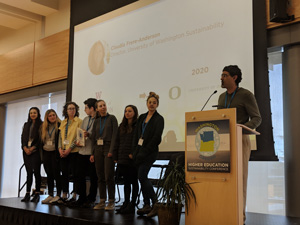 We closed this year by announcing the location of WOHESC 2020 at the University of Oregon in Eugene on March 2-4th, 2020. We are already planning for next year and want to be sure we get your feedback - so please fill out our 2019 survey to give us feedback on your 2019 experience and what you hope to see at WOHESC 2020. Presentations for all breakout and general sessions are now live on the Website so be sure to review and take a look at the sessions you might have missed. Thank you for joining us and we look forward to seeing you next year!!
We closed this year by announcing the location of WOHESC 2020 at the University of Oregon in Eugene on March 2-4th, 2020. We are already planning for next year and want to be sure we get your feedback - so please fill out our 2019 survey to give us feedback on your 2019 experience and what you hope to see at WOHESC 2020. Presentations for all breakout and general sessions are now live on the Website so be sure to review and take a look at the sessions you might have missed. Thank you for joining us and we look forward to seeing you next year!!
We owe a huge thank you to our media partners, community partners, and sponsors for helping build awareness about the event and putting your support toward WOHESC. From spreading the word via email and social media to sponsoring sessions and sharing in our passion for environmental change, thank you for helping to make WOHESC happen!
If you're interested in confirming your support for WOHESC 2020 please contact savannah@wohesc.org.
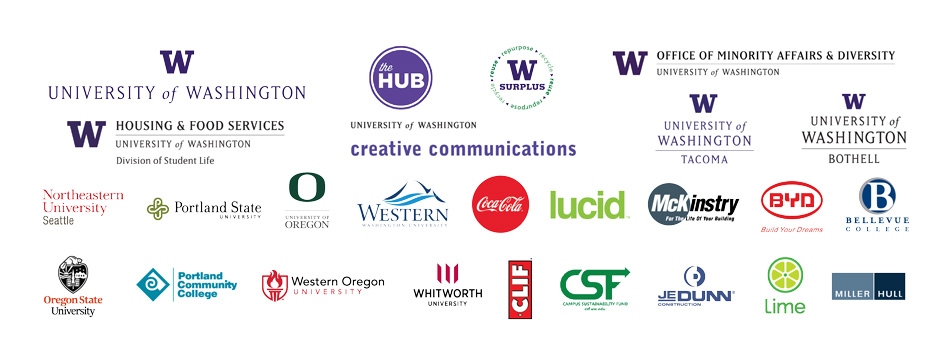
![]()
Meet The McKinstry Champions of Sustainability Scholarship Winners
 The Champions of Sustainability Scholarship gives higher education faculty and staff a chance to showcase their exemplary work in sustainability and share how it aligns with the WOHESC mission the chance to share how their work aligns with the WOHESC mission. Learn more about our three winners below. Thank you to McKinstry for sponsoring this fantastic opportunity.
The Champions of Sustainability Scholarship gives higher education faculty and staff a chance to showcase their exemplary work in sustainability and share how it aligns with the WOHESC mission the chance to share how their work aligns with the WOHESC mission. Learn more about our three winners below. Thank you to McKinstry for sponsoring this fantastic opportunity.
Troy Builta, Building Information Management, Mapping and Sustainability Specialist at Mt. Hood Community College
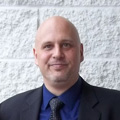 In his role at Mt. Hood Community College, Troy manages all of the building information blueprints and archive plans while creating maps, floor plans, and 3-D renderings for building/room design and space planning. Additionally, he is the Sustainability Coordinator, where he facilitates the Sustainability Committee as the Chairperson. He is engaged in several other councils, committees, and groups such as the Infrastructure Council, the Wayfinding Committee, the City of Gresham's GREAT Businesses, Strategic Energy Management, and the new Conservation Club through the Student Government.
In his role at Mt. Hood Community College, Troy manages all of the building information blueprints and archive plans while creating maps, floor plans, and 3-D renderings for building/room design and space planning. Additionally, he is the Sustainability Coordinator, where he facilitates the Sustainability Committee as the Chairperson. He is engaged in several other councils, committees, and groups such as the Infrastructure Council, the Wayfinding Committee, the City of Gresham's GREAT Businesses, Strategic Energy Management, and the new Conservation Club through the Student Government.
In the past few years, Troy has been working with the Sandy River Basin Watershed Council for the Clean Water Retrofit Project so that Mt. Hood Community College can filter their runoff from roadways and parking lots before it goes into creeks and streams. This helped MHCC to become the first Salmon-Safe certified community college in the nation. He also helped bring the annual Conservation and Repair Fair to the college in 2017. Troy has been the Sustainable Saints team captain for the EcoChallenge for the past three years.
Ellen Moore, Senior Lecturer, University of Washington Tacoma
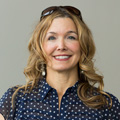 Ellen Moore's research, teaching and practice at the University of Washington Tacoma revolve around the interconnection of media and the environment. Part of her pedagogy involves actively challenging students to consider their environmental impact in a consumption-focused society. To date, she and her students have participated in the "Plastic Free" challenge, where they chose to go without any disposable plastic for a month; the "Carbon Challenge," where students tried to lose 5,000 pounds of carbon weight in a quarter; and (this quarter) Ellen and her students are joining the Buy Nothing New movement, where they will buy nothing new for the next eight weeks. She and her students also have worked with two universities in Vietnam to address the global issue of plastic pollution in our oceans through a Collaborative Online International Learning (COIL) class.
Ellen Moore's research, teaching and practice at the University of Washington Tacoma revolve around the interconnection of media and the environment. Part of her pedagogy involves actively challenging students to consider their environmental impact in a consumption-focused society. To date, she and her students have participated in the "Plastic Free" challenge, where they chose to go without any disposable plastic for a month; the "Carbon Challenge," where students tried to lose 5,000 pounds of carbon weight in a quarter; and (this quarter) Ellen and her students are joining the Buy Nothing New movement, where they will buy nothing new for the next eight weeks. She and her students also have worked with two universities in Vietnam to address the global issue of plastic pollution in our oceans through a Collaborative Online International Learning (COIL) class.
Ellen's teaching and research also focus on environmental justice. Her latest book ("Journalism, Politics, and the Dakota Access Pipeline") reveals her work with the Standing Rock Sioux Tribe, including their perspectives, thoughts, and beliefs on the Dakota Access Pipeline and on the mainstream media. Currently, she is teaching her new course "Ecology, Inequality, and Popular Culture." She lives in Tacoma with her husband Paul and their two Marvel dogs Loki and Groot.
Katrina Taylor, Professor of Political Science, Tacoma Community College
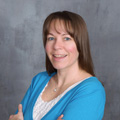 A Michigan native originally, Katrina Taylor is an alumna of Michigan State University, where she studied environmental policy and anthropology. She completed post-graduate studies at Northern Arizona University, in Flagstaff, while working as a teaching assistant and Grand Canyon hiking guide. She has taught political science and environmental sustainability at Northern Arizona University, Central New Mexico Community College and Tacoma Community College where she currently holds a tenure track position in the Department of Political Science.
A Michigan native originally, Katrina Taylor is an alumna of Michigan State University, where she studied environmental policy and anthropology. She completed post-graduate studies at Northern Arizona University, in Flagstaff, while working as a teaching assistant and Grand Canyon hiking guide. She has taught political science and environmental sustainability at Northern Arizona University, Central New Mexico Community College and Tacoma Community College where she currently holds a tenure track position in the Department of Political Science.
Katrina facilitates experiential education and community engagement in both her political science and environmental sustainability classes, encouraging students to critically reflect on their individual habits and practices related to both the political system and the environment. She has studied and advocated for the issue of climate change for over 20 years and is interested in reforming the education system to focus on preparing students and society for the ecological challenges of the future.
![]()
Plenary Speaker Interview | Mary Wood, Philip H. Knight Professor, Faculty Director, Environmental & Natural Resources Law Center, University of Oregon School of Law
WOHESC: WOHESC focuses on promoting sustainability within the realm of higher education. What do you feel is most important for attendees to take with them after the conference?
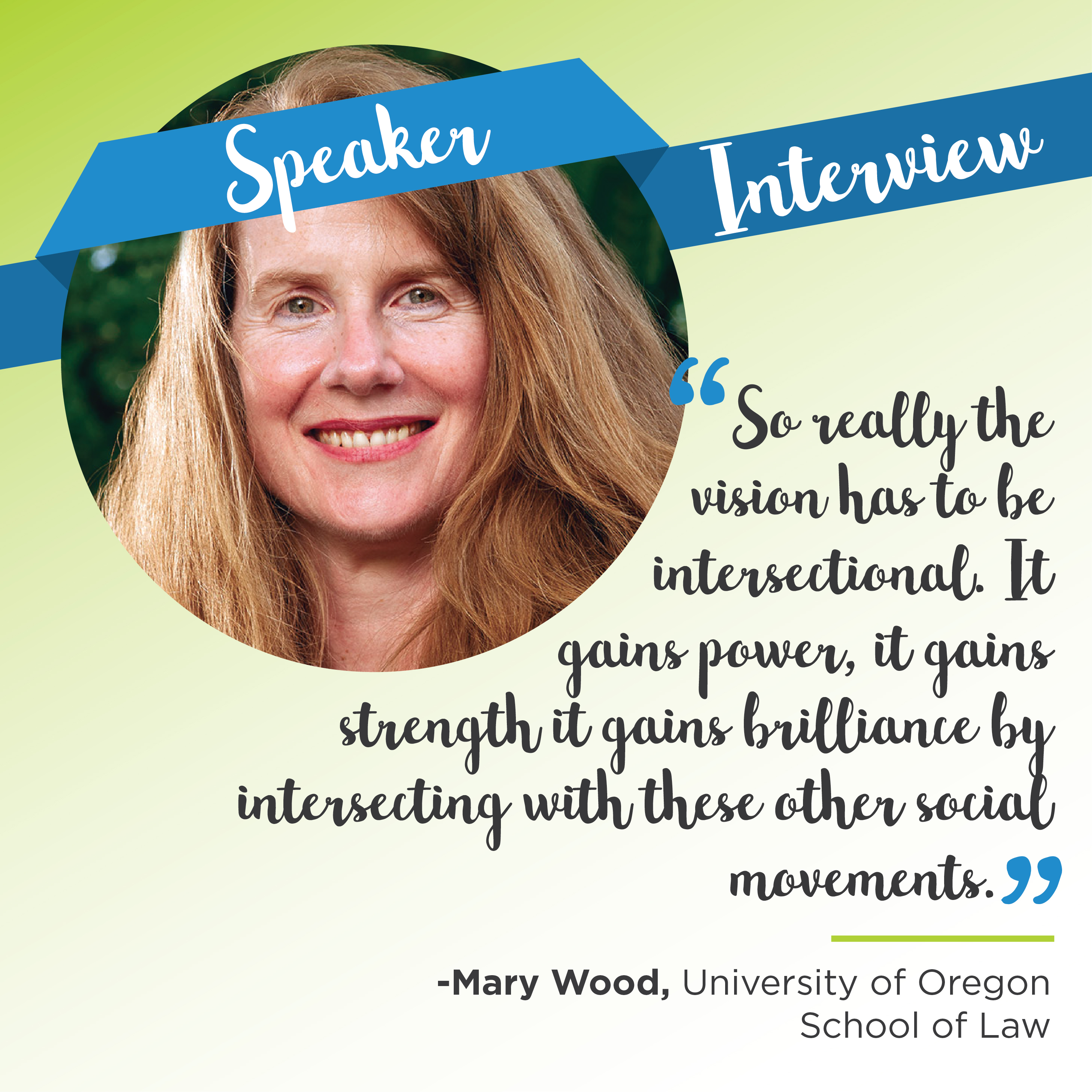 Mary Wood: We are in the middle of a climate emergency and are running out of the time we have left to actually avert runaway climate heating. What I hope people takeaway is not only a sense of the urgency, but a sense of their role in responding to it. Young people all around the world are rising up because their futures are on the line. I hope that everybody at WOHESC feels a surge of inspiration and momentum, and also has a practical sense of what they can do. What they can do will range from pressing their government to act, which is probably the most important thing, but also just rethinking their daily lives in terms of consumption and waking up tomorrow doing things differently than today. Waking up their communities to this sense of urgency has got to bea war effort multiplied by several factors. It's still possible to pull ourselves out of this but if people just think of this as gloom and doom and are not empowered, they won't do anything except for lapse into denial or despair. So I do hope to inspire people and tell them this is their moment.
Mary Wood: We are in the middle of a climate emergency and are running out of the time we have left to actually avert runaway climate heating. What I hope people takeaway is not only a sense of the urgency, but a sense of their role in responding to it. Young people all around the world are rising up because their futures are on the line. I hope that everybody at WOHESC feels a surge of inspiration and momentum, and also has a practical sense of what they can do. What they can do will range from pressing their government to act, which is probably the most important thing, but also just rethinking their daily lives in terms of consumption and waking up tomorrow doing things differently than today. Waking up their communities to this sense of urgency has got to bea war effort multiplied by several factors. It's still possible to pull ourselves out of this but if people just think of this as gloom and doom and are not empowered, they won't do anything except for lapse into denial or despair. So I do hope to inspire people and tell them this is their moment.
WOHESC: This lawsuit has the potential to influence how we think about climate action within the public sphere. As an educator, what do you want those learning about this case for the first time to know?
MW: They need to know the monumental urgency the case embodies, and the government's obligation to them. Legally, the government has an obligation to all of us and that has been ignored. This case tries to invoke the third branch of government, which has just been sitting like a wallflower throughout this crisis. It tries to press that third branch of government to step up to its role of enforcing these fundamental rights of citizens, which are in both the constitution and the public trust principle.
WOHESC: As an educator, what do you feel like higher education's responsibility is to the next generation in understanding climate recovery?
MW: Three things. One: I think that higher education needs to teach in every single class that the climate crisis envelops all of society. Every single discipline must be brought to bear to address it. So at the University of Oregon we have climate taught in English classes, Spanish classes, piano classes, you name it. That is what needs to happen.
Number two: University professors need to make the time, space, tools and credit to allow students to engage their government and take on decarbonizing projects. In every single class, literally. I think professors should give time and academic support for students to work on this problem. In my classes I make it a credit requirement to engage in government. Students have to write a civic letter, and I also give credits to work on projects to help society decarbonize. Students are given the opportunity and credit toward actually solving the problem instead of studying the problem. We don't need more study - we need solutions.
Number three: Universities have not been aggressive in lowering carbon emissions. I look around my own faculty and there are still people flying to other countries to just join a panel at a conference. We've got to suspend faculty international flights. Faculty needs to reprioritize their flying, and in addition, universities need to be very aggressive in lowering carbon emissions. They need to eliminate plastic bottles, single use plastics, and they need to get better transportation mechanisms for students.
I think that they should have an internal carbon tax. In other words, when faculty members fly, they should be taxed internally, from their funds for that flying and that taxation can go into on-campus projects to lower the carbon footprint - renewable energy projects like solar electric cars. Many universities are doing it now but they're a drop in the bucket compared to what's possible. So I think truly this year universities have to slash carbon emissions because we only have until 2020 to push down the curve or we will miss those tipping points that take us into runaway heating. The UN said we have to reduce emissions by 45% by 2030, we can't wake up in 2029 and start that effort. The much more daunting mandate is to at least push the carbon emissions curve down by next year. It is now rising at the fastest it ever has and that's because of President Trump. Young people need to contextualize this president and the danger he is putting everyone in.
WOHESC: How do you feel that inclusion and equity play into environmental protection?
MW: I think that environmental protection was very much a siloed endeavor in past decades. It ignored inclusion, it ignored equity, and it ignored economics. The vision has to be intersectional. It gains power, it gains strength, and it gains brilliance by intersecting with these other social movements. When you bring them all together you find that we really do need an economic paradigm that includes everybody. The kind of oligarchical model of governance that favors very large corporations and a few special interests, and excludes people who have been excluded in the past, doesn't lead us anywhere except for over the climate cliff. So to change on part of society, we need to change it all. Just pulling forth the values of inclusion and equity gives the environmental sustainability value that much more power.
WOHESC: What would say our responsibility as members of the Pacific Northwest community is? How can we, within WOHESC, educate the rest of the United States?
MW: Number one is that we've been targeted as the corridor for massive fossil fuel projects. I believe that Northwesterners are rising up, and are holding what's called the thin green line to prevent every one of those fossil fuel products. If instead of a corridor we become a chokehold, we could play a significant role in winding down this deadly industry.
The second role we play is that we live close to nature and we understand the means of our survival. The means of our survival are not in their supermarkets and they're not in the paychecks - they are literally in our natural resources. We to need to educate other people about the absolutely vital role that nature plays in our survival. I don't think people get that in some other settings but I do think many Northwesterners do understand that because they do tend to be connected to nature.
The third is a real fundamental leadership in transforming our lifestyles, as well as the demands that we make on the government to accommodate those lifestyles. We need to actually envision our relationship with time, consumption food, energy, and transportation. I think the people of the Northwest can do that. I often say this is the epicenter of the world in the climate movement because we can fundamentally reimagine how we live. People are doing that all over the place, but it's got to spread like fire. How can neighborhoods share a car? How can neighborhoods share a solar garden? How can neighborhoods get a neighborhood garden, in every single neighborhood? This goes to equity and inclusion as well, because many of these new ideas not only decrease carbon, they increase the ability to meet the needs of disadvantaged communities. Much of the reason disadvantaged communities struggle so much is that no one has tapped the potential for communities meeting needs. So we need local energy, local food, ad local transportation. The more you start looking to your community to meet those needs, the less dependent you are on these corporations that are driving us towards the climate cliff.
There's an element of democratization in all of this. With self-sufficiency comes democracy because you're dealing from a position of community and power, whereas if you just live your life beholden to huge corporations for every aspect of life, you become enslaved without knowing it.
![]()
Plenary Speaker Interview | Kiran Oommen, Student, Seattle University and Plaintiff, Juliana vs. US
WOHESC: WOHESC focuses on promoting sustainability within the realm of higher education. What do you feel is most important for attendees to take with them after the conference?
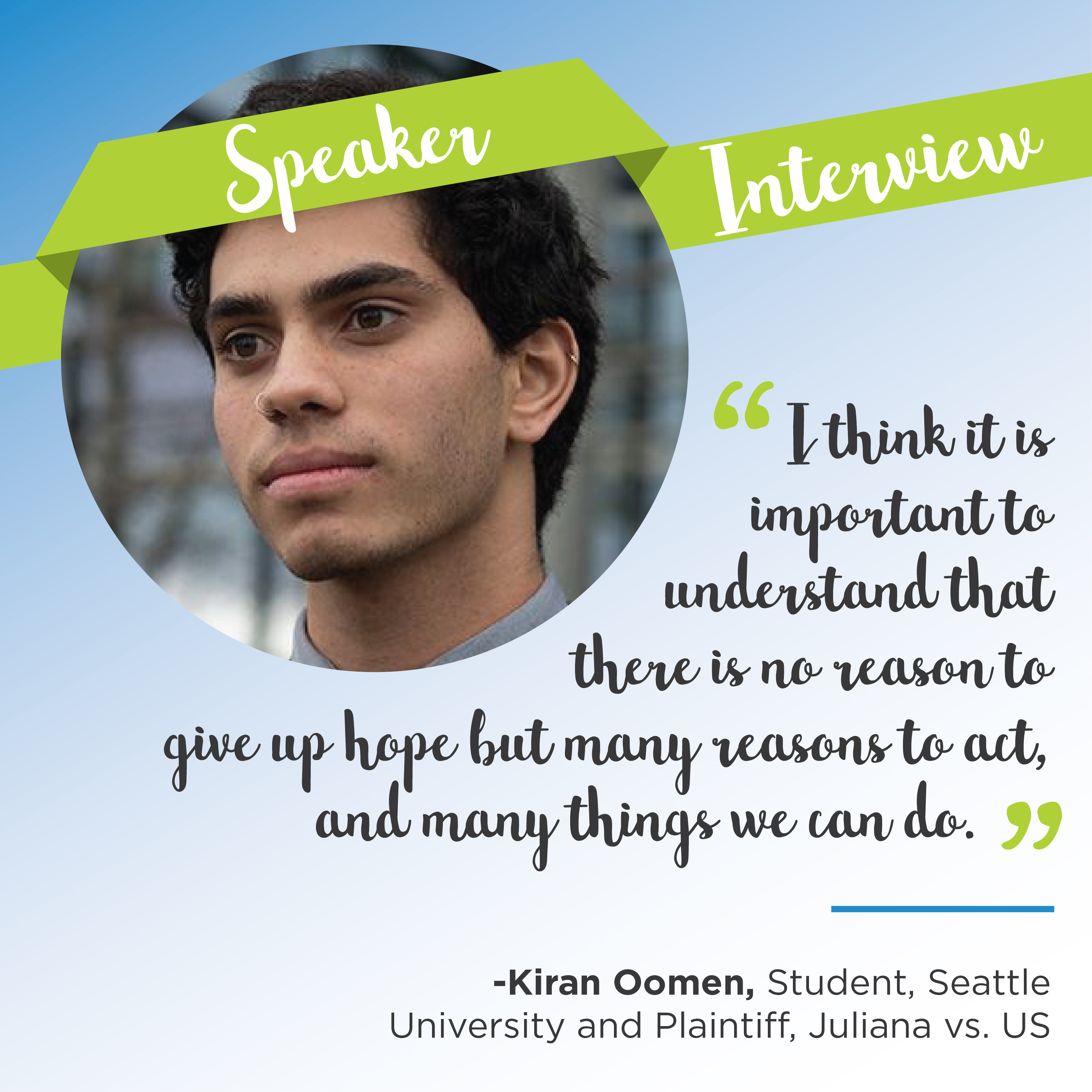 Kiran Oomen: In regards to promoting sustainability in higher education, I think there are two
main points we need to be focusing on. For one, pushing our individual
institutions to be more sustainable, making sure all new buildings are LEED
certified, divesting from fossil fuels, divesting from banks that fund pipelines,
recognizing indigenous sovereignty, etc, is all important. Many groups within
institutions are working hard at this, and we can always support each other in
doing more. However, I think the other side of the coin is often overlooked but of
no less, perhaps even more importance-that is, creating an educational
atmosphere that encourages and prepares students for civic engagement and
critical questioning. Climate change is a global issue, and everyone has a role to
play in fighting it. Therefore, I believe that part of promoting sustainability in
higher education must include supporting students and faculty in making change,
be that direct action, education or political engagement. We must push our
educational institutions to be better, but we can't stop there.
Kiran Oomen: In regards to promoting sustainability in higher education, I think there are two
main points we need to be focusing on. For one, pushing our individual
institutions to be more sustainable, making sure all new buildings are LEED
certified, divesting from fossil fuels, divesting from banks that fund pipelines,
recognizing indigenous sovereignty, etc, is all important. Many groups within
institutions are working hard at this, and we can always support each other in
doing more. However, I think the other side of the coin is often overlooked but of
no less, perhaps even more importance-that is, creating an educational
atmosphere that encourages and prepares students for civic engagement and
critical questioning. Climate change is a global issue, and everyone has a role to
play in fighting it. Therefore, I believe that part of promoting sustainability in
higher education must include supporting students and faculty in making change,
be that direct action, education or political engagement. We must push our
educational institutions to be better, but we can't stop there.
WOHESC: Tell us a bit about why you chose to take part in Juliana VS the United States?
KO: I strongly believe that we all have a responsibility to our families, our communities, and the planet to fight social problems and make the world a better place. I have been involved in social movements from queer rights and homelessness issues to forest defense since I can remember, first with my parents support and then on my own. When I was asked by a fellow plaintiff my senior year of high school if I wanted to sign on to the lawsuit I saw this as far out, perhaps unrealistic, but ultimately another untested attempt to address this issue society has been so slow to address. Now, almost four years later, my passion and energy for this case has only grown. Climate change is hurting people, including myself and those I love, right now, and is only getting worse. Connecting these clear effects to our constitutional rights needs to be established in the courts and in our society.
WOHESC: This lawsuit has the potential to influence how we think about climate action within the public sphere. As an educator, what do you want those learning about this case for the first time to know?
KO: One important part of our case, as I mentioned before, is to make the connection between constitutional and fundamental rights and the effects of climate change. Without a stable climate, our rights to life, liberty and property cannot be upheld, and while that seems obvious, our case is a chance to bring that knowledge into law. I also think we all need to notice the way the government has responded- they are not denying our facts, not denying climate science, they are delaying and trying to evade responsibility. We are asking for a science-based climate recovery plan that will put us on track to stabilize the climate in accordance with the best climate science. I think it is important to understand that there is no reason to give up hope but many reasons to act, and many things we can do. Holding the government accountable for the harms they are causing people is important, and using the resources and knowledge we have to better society and the world is imperative. Our case is not the first time those in power have ignored the best interests of the people and the planet, but it is an opportunity to call them out for it and provide another option.
WOHESC: As a student, what role do you feel environmentalism and sustainability play in your educational experience?
KO: Learning about ecology and environmental science has been essential in my understanding of the world as a whole, and that essential involves learning about sustainability and climate change. As a sociology student, studying gender, race and political economy has also been vital to my understanding of the movement. My life revolves around the planet and it's changes, as earth is the only home I will ever know. Understanding these things-environmentalism and sustainability-are to me the most important things to understand going into the world as an adult.
![]()
 Keynote Interview | Laura Clise, Founder and CEO of Intentionalist
Keynote Interview | Laura Clise, Founder and CEO of Intentionalist
Your social enterprise, Intentionalist, helps individuals connect with local businesses and the people behind them. Tell us more about how this organization came to be.
I would like the ability, wherever I am in the world, to know and to choose who benefits from the money I spend. The idea for Intentionalist was initially sparked by my experience as a tourist traveling in Southeast Asia. At the time, I was leading sustainable development for a multinational corporation, and thinking a lot about how to harness market forces in support of sustainable growth. While exploring Northern Thailand, I wanted the money I spent to benefit the local economy, and more importantly, people who were a part of the communities I was visiting.
A couple of years later, I developed the supplier diversity program for the corporation I was working for and was struck by the resources and strategies that other companies and government entities had developed to increase sourcing from small, women, minority, and veteran-owned suppliers. I noted that supplier diversity programs were rooted in the recognition that when diverse small businesses thrive, it benefits communities and the country as a whole.
Last year, as I thought through the challenge currently confronting Seattle and other cities throughout the country when it comes to inclusive growth, it occurred to me that while consumer spending is tied to our understanding of the health of our economy, it is under-leveraged when it comes to the health of our communities.
Intentionalist is about making it easy for consumers to find local small businesses and learn about the diverse people behind them. We do that through an online guide that emphasizes not only the product or service offered by brick and mortar small businesses, but also connects consumers to the business owners" we make "small" and "local", "personal." With Intentionalist, transactional purchases become purposeful support for people and communities that matter, and it all begins with everyday decisions about where we eat, drink, and shop.
Put another way, Intentionalist is about harnessing consumer spending in support of a more inclusive economy. Yes, government and non-profit organizations have a role to play when it comes to a thriving, diverse small business community, but it's also important to recognize the opportunity for all of us, as consumers, to make a difference and support our communities through the money we spend.
What role would you say equity and environmental justice play in our higher education system? How can we create space for diversity within these institutions?
Institutions across all sectors need to integrate a deep understanding of equity and environmental justice into their strategies and programs. Higher education has an important role to play when it comes to both the research that substantiates the need for an equity lens and also regarding the education and development of the leaders who shape our institutions.
Climate change is something that is best understood and modeled through science, but its impacts demand a more nuanced examination of the communities impacted and cannot be mitigated through technology alone. With tremendous technology available to reduce greenhouse gas emissions today, the challenge we face is rooted in human behavior.
An examination of our history teaches us that communities of color and poorer communities often bear the brunt of environmental consequences. As the demographics in the U.S. continue to shift, and as we grapple with the tremendous economic inequality in this country, higher education institutions can help inform and guide our path forward.
We create space for equity and inclusion within institutions of higher education, not only by holding ourselves to account when it comes to measuring our progress according to diversity metrics but also by helping to shape new frameworks and tools for organizations across all sectors to measure their equity impact. In time, organizations will be called to substantiate whether they contribute to or detract from a more equitable society" high education can help us to better understand how to approach the measurement thereof.
What would you say is the role of small businesses in helping to reduce climate change?
As the majority of businesses in the U.S., small businesses absolutely have a role to play when it comes to climate change. However, effectively engaging them should reflect an understanding of how they differ from larger companies and other organizations.
What do you hope attendees take away from your presentation?
At times, the challenges we face can feel insurmountable. We're committed to doing our part toward a more sustainable, equitable future, but at times, it can feel like a Sisyphean endeavor.
I hope that I will leave attendees with:
-A sense of agency and efficacy that the work we're all doing at and beyond the level of our individual department and institutions matters and is making a difference.
-A reminder that the problem and solutions are people, which means that to effect change, in many ways, we are building a movement.
-A call to action when it comes to the decisions we make on a daily basis to periodically pause and take a moment to #BeIntentional consider how we are personally contributing to a more equitable society through the money we spend every day.
![]()
 The UW was founded in 1861 and is recognized as a national leader for its deep commitment to sustainability on our campuses and in the community. The UW also recognizes that diversity - one of UW's six core values - is integral to excellence, and we strive to create welcoming and respectful learning environments, and promote access, opportunity and justice for all.
The UW was founded in 1861 and is recognized as a national leader for its deep commitment to sustainability on our campuses and in the community. The UW also recognizes that diversity - one of UW's six core values - is integral to excellence, and we strive to create welcoming and respectful learning environments, and promote access, opportunity and justice for all.
EcoReps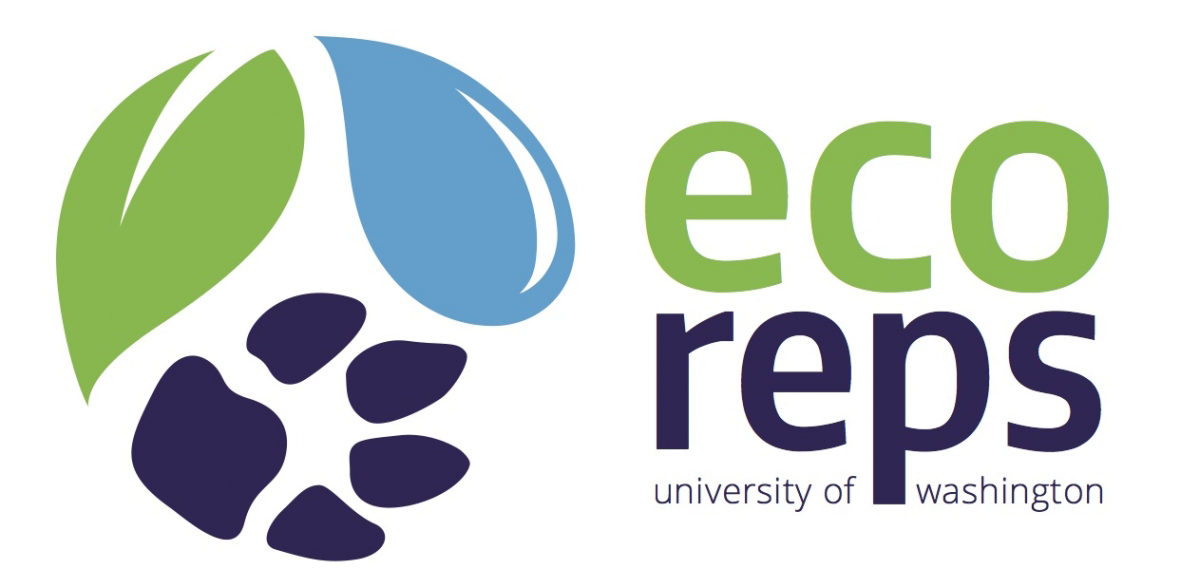
EcoReps is a student-run organization that works with our peers, faculty, and staff to make the University of Washington a more sustainable place by implementing green ideas.
Sustainability in the Arts (SITA)
The Sustainability in the Arts (SITA) initiative will explore current and potential sustainability operations or 'behind the scenes' efforts in the arts, as well as explore how sustainability themes can be incorporated into the content of creative works.
Green Dawgs Certification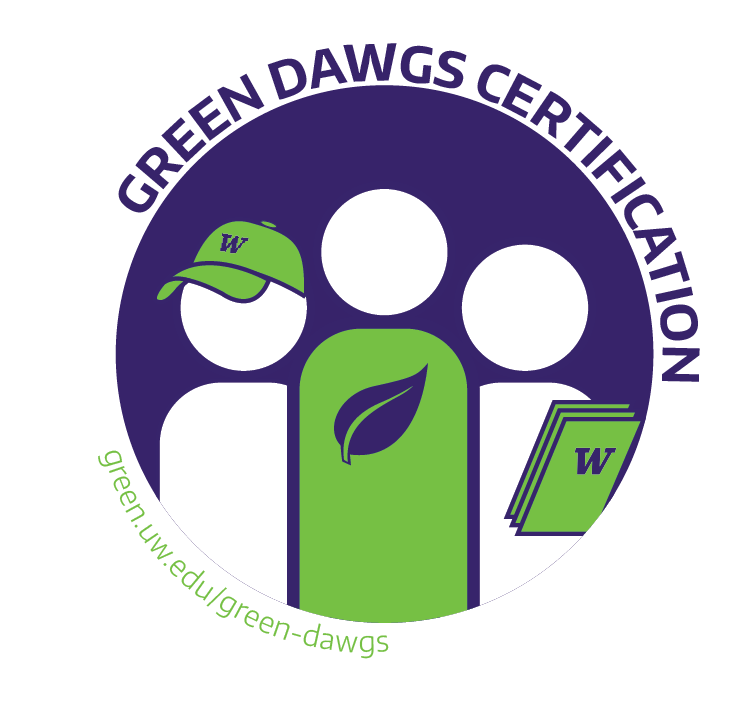
The Green Dawgs Program at the University of Washington encourages RSO's to make their meetings, events, and member practices more sustainable. The program provides a framework for self-evaluation as well as resources to help student groups implement sustainable practices within their clubs.
Sustainability and Medicine (SAM)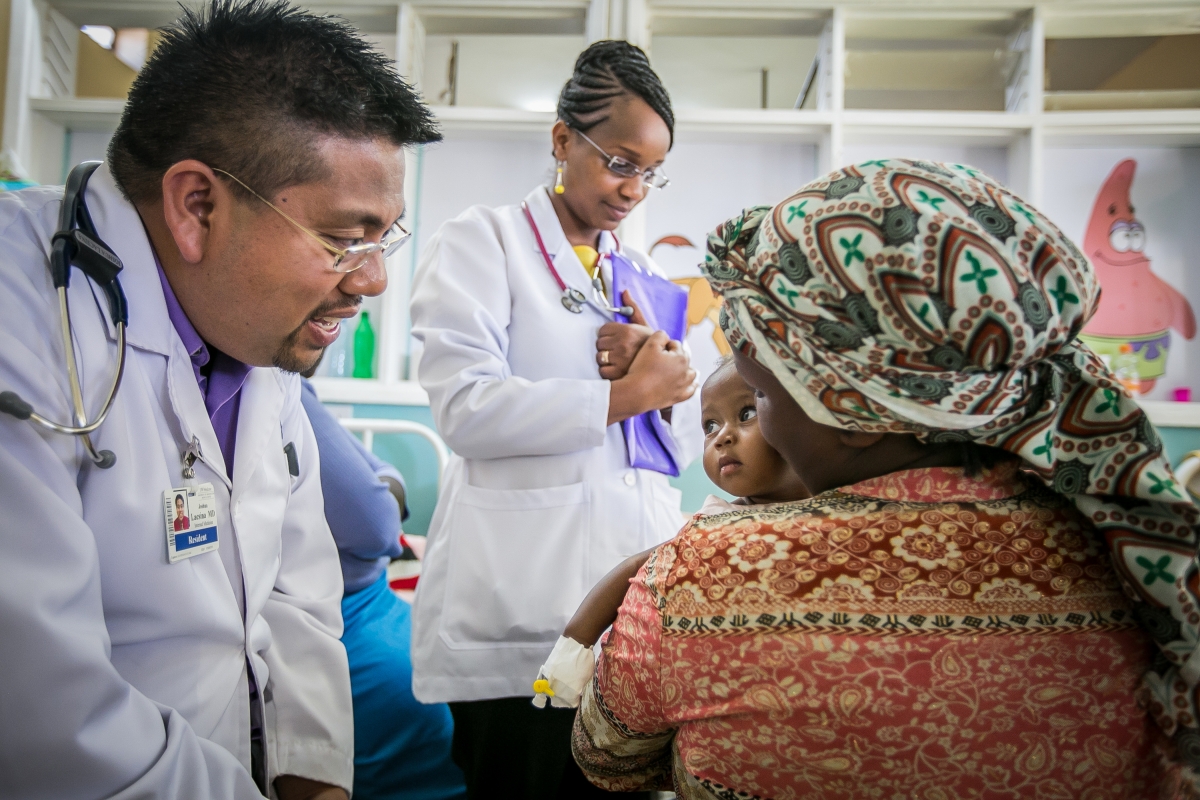
Sustainability and Medicine (SAM) is a facility-by-facility effort to coordinate and optimize sustainability practices that improve patient outcomes, reduce expenses through resource and process efficiency, and strengthen stakeholder relationships.
![]()
Click here to view the 2018 Blog Entries
 © 2026 | Event by Social Enterprises, Inc.
© 2026 | Event by Social Enterprises, Inc.
PO BOX 31039
Portland, OR 97231
Office | 503.226.2377
Toll Free | 1.855.740.8417